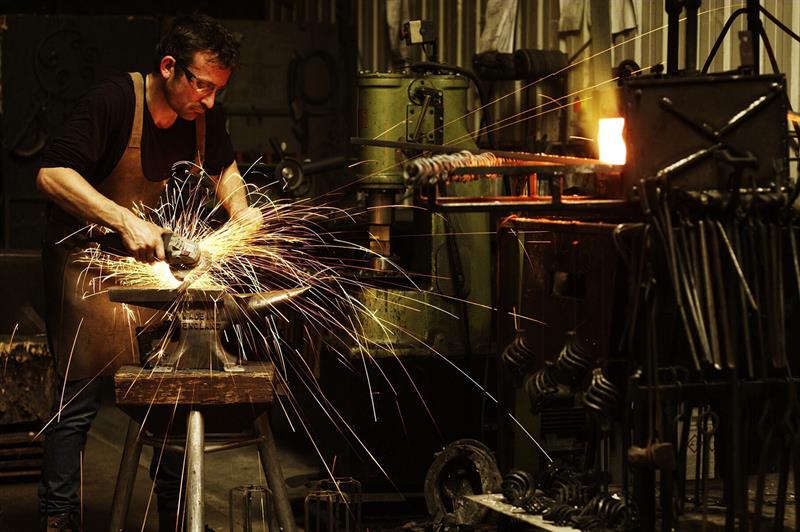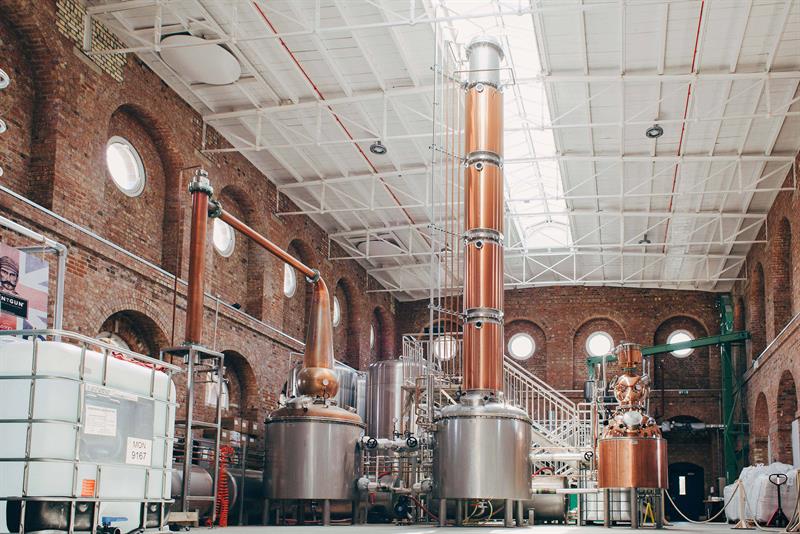The UK manufacturing industry is made up of many sectors, from automotive and aerospace, to medical, textiles and nuclear – to name a few. However, a sector that, perhaps, isn’t shouted about as much as it should be is the UK crafts industry – a booming sector that, according to the Crafts Council, contributes £3.4 billion to the UK economy.
Craft businesses have been around for centuries and often involve an artisan or artisans using a hands-on approach with a variety of mediums in a small operational setup.
This is the total opposite to the more well-known and popular mass production setups that most of us are familiar with today, so Manufacturing Management (MM) set out to explore whether some of the big challenges facing many of the industrial giants also apply to this niche sector.
Industry challenges
Brexit and the so-called Fourth Industrial Revolution are challenges familiar to most people. Britain is walking away from the European Union in 2019 following the Brexit Referendum in June 2016 and the triggering of Article 50 by Prime Minister Theresa May in March 2017, while Industry 4.0 or ‘4IR’ has been touted as the next big thing for some time now, with manufacturers up and down the country trying to get to grips with how to implement it across their sites.
And, if that wasn’t enough, industry is also facing a skills crisis. Research carried out by MM last year (see MM April 2017) found that a daunting 65% of site managers plan to retire in the next five years, with 62% believing that they will be taking irreplaceable skills with them and just 28% stating that there is a succession plan in place for when they depart.
Politicians, manufacturers and academia are well aware of these challenges. In fact, you only had to attend the EEF National Manufacturing Conference in February (see MM March 2018) to realise how hot these topics are.
A crafts world
Data on the crafts sector is quite scarce but improving thanks to the Crafts Council. A report it commissioned from economist Mark Spilsbury and released in February this year (http://bit.ly/2FWutst) suggests that workers in craft occupations are more likely to be older than those in all occupations (40% are age 50+).
The publication also suggests that people working in craft occupations are qualified to lower levels. A quarter are qualified to Level 4 and above, compared to 43% of the overall workforce, while at the other end of the scale, 33% have low or no qualifications, compared to 21% of the overall workforce, it says.
MM decided to sit down with two UK craft makers to find out what they do, how they are coping with the challenges facing industry, and what the future may hold for their businesses...
Made by the Forge
Location: Elmsett, Ipswich
Business Type: Iron craft
Number of Employees: Six
 Summary:
Summary:
Made by the Forge is a small, family-run business that handcrafts solid wrought iron curtain poles, designer lighting, kitchen racks, door handles and bracketry. The company was founded in 2006 by farrier and blacksmith Richard Fishenden and his wife and business partner Juliet.
It aims to produce useful products that will last a lifetime, with these sold online and in Heal’s, the British contemporary furniture and lighting store in London. More recently, Made by the Forge has tapped into support from the Manufacturing Growth Hub (https://bit.ly/2jS5E84) and teamed up with British designers Anthony Dickens and Chris Eckersley to develop designer lighting and furniture.
MM’s Adam Offord met with Richard, at the forge in Elmsett, near Ipswich, to find out more.
How important is training to the business and is it difficult trying to find new talent?
Skilling and training for the staff and myself are very important. Of our six employees, we have an apprentice in the workshop who goes to college for one day a week. For myself, once you qualify as a blacksmith and farrier you don’t need to do any retraining, but I do a lot of business training courses in things like management.
This is a really rewarding career because you see the whole craft process from start to finish. A lot of blacksmiths do what they do for the love of the craft but finding the right skill set is hard. I tried to recruit in December but no one was looking for work.
Has Brexit had any impact on the business so far?
You would think that it would have had some sort of impact, but our business has actually grown. All components used by the company are British sourced and we offer a personal, friendly service with all pieces being made to order. We have seen demand for our iron craft range grow by 30% over the last 18 months and I wonder if people are saying, “Oh Brexit, let’s just do our house up instead”.
Where does technology sit within the business?
This kind of craft has been around for centuries and I think that it is at the top of where it can be within the forge.
People like our products because you can see the individual hammer marks made by our blacksmiths using traditional, hand-crafted techniques. I don’t think you would get the same result with, say, a robot or automation, so the workshop isn’t going to be changing any time soon!
However, we have invested in cloud-based technology – a CRM system – because all of our sales are done online through our website.
How do you ensure the safety of your staff?
We are working with iron, hand tools and machinery, so health and safety is a very important factor to us and something that we keep on top of. We carry out regular health assessments and all staff within the forge are reminded to wear their personal protective equipment (PPE) such as safety goggles.
The business also recently invested in air benches because of what may be in the air. It has nothing to do with the financial side, but the staff. A good, clean working environment encourages everyone to do their best, and at Made by the Forge, we have high standards to maintain.
What are your plans for the future?
The plan for the next three years is to double turnover and introduce two or three more people into the workshop. We are nearly at maximum capacity within the workshop too, so ideally, we need to move to bigger premises.
Copper Rivet Distillery
Location: Pumphouse No.5, Chatham Dockyard, Medway, Kent
Business Type: Handcrafted spirits
Number of Employees: 15

Summary:
The Copper Rivet Distillery is a new Medway-based craft distillery that produces small batches of gin, whisky and vodka, from scratch, in bespoke stills. A dream-turned-reality for Bob Russell and his two sons Matthew and Stephen, the company has a history that would put a smile on many faces.
The Russell family began planning for a distillery in 2005 and, in 2012, Stephen Russell met head distiller Abhi Banik. The family’s heart was set on establishing a distillery in Kent, and Medway in particular. Over the years, the Russell family had looked at several different locations across the county. One day, by chance, Matthew Russell and his family visited nearby Upnor Castle, where he spotted Pumphouse No.5 across the River Medway. The following Monday, Matthew drove to Chatham Maritime and discovered it was for sale. Copper Rivet Distillery had found its home and in 2016 it distilled for the first time.
Managing director Matthew Russell invited MM’s Adam Offord to Pumphouse No.5 to find out more.
Has Brexit had or likely to have any impact on your business?
Brexit won’t have an effect on us. We are actually in a really good position as we are new to the scene and we source our raw materials – barley, wheat and rye – from a local farm called Burden Bros on the Isle of Sheppey in Kent. We don’t currently have a large amount of exports to Europe. You could say we have a good mix of industry and agriculture locally and so most of our inputs are not greatly affected.
We also don’t have the same problem as some businesses with regard to sourcing machinery from overseas. When we were first starting out, we visited some distillery equipment manufacturers abroad to get an idea of what was needed, but eventually decided that we needed something unique to ourselves.
We came up with some initial distilling machinery ideas and then approached a local company in Kent to fabricate them for us (see image, top right). The equipment they manufacture is often shipped abroad, so they were thrilled to be able to come and see something that they made in action on their doorstep.
Industry is struggling to find new skills and talent. How is the Copper Rivet Distillery coping?
We are lucky that we have Abhi, our lead distiller. Stephen met him at the International Centre for Brewing and Distilling in Edinburgh, where he was teaching brewing and distilling to post-graduates. We are fortunate that he has such experience and has worked with graduates before as he can tell if people are right for the business.
At the moment we also have three trainee distillers with subject backgrounds including chemistry and engineering. We always wanted to set the business up in Medway, not only because this is our home, but because it has a strong craft and trades background – at the universities (Greenwich and Kent both have campuses nearby) and Chatham Dockyard.
Typically, we look for people aged 18 or over because we are in the craft alcohol business and post-graduates with strong backgrounds in relevant subjects usually tick that box. Obviously, if the Copper Rivet is where they are starting out, then like most businesses, there is always that risk they will move on once they have the relevant experience. But I don’t have a problem with that as we can almost create a legacy or some sort of Copper Rivet alumni here in Chatham.
For people that don’t know much about the business or distilling, we also run tours. This is a great way for members of the public to come and meet the team and see how we make and produce our range of spirits from grain to glass, including the distilling process in action and some of the flavour profiling in our laboratory.
What are your plans for the future?
Distillers have to wait three years for whisky to mature, so our Masthouse Whisky will be launching in 2020. We currently have Vela Vodka, Dockyard Gin and Son of a Gun – an English grain spirit – on the market. We have got a listing in John Lewis for Dockyard Gin and Son of a Gun, and other deals with Waitrose and Co-op. In addition, we are looking to export a lot more.
Events are also big in the craft distilling sector. We have an events team that take part in regional shows and last year we attended 50 events, with an aim to double that this year. We are also a supporter of events that involve bars and shops.










